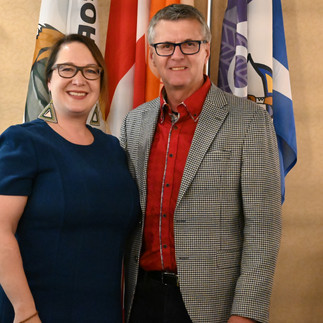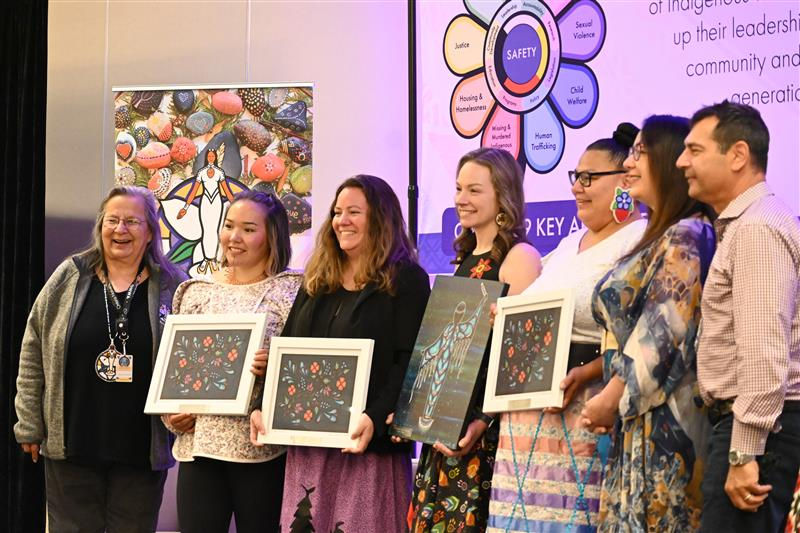Congratulations to the winners of ONWA's 2023 Recognition Awards
- ONWA
- Sep 9, 2023
- 5 min read
Updated: May 30, 2025
Each year, the Ontario Native Women's Association (ONWA) recognizes women whose work and contributions to the Indigenous community have made an impact upon the quality of life of Indigenous women and their families. Award recipients are nominated by their peers and are based on the listed criteria. Awards were presented during the Gala Dinner at ONWA's 52nd Annual General Assembly (AGA) and Leadership Conference.

Scroll down or click to see the winners of...
Winner of the Alice Souliere Bursary Award
The recipient should have demonstrated either the personal pursuit of language development or have assisted in community projects that promote language development.

Karennotakies Barnes
Karennotakies is a language advocate currently part of the Onkwawenna Kentyohkwa Mohawk language program learning the Mohawk language and working on becoming a land-based teacher. She can often be seen sharing the Mohawk language on her social media.
She was apart of the Language market in Six Nations, where she was a vendor and spoke the Mohawk language. She also helps various program with creating language resources and helps promote the use of mohawk language in everyday life.
Karennotakies helps bridge the gap between the classroom and home. She shows the importance of using what you know no matter how little it may be. Small changes can create a big impact on our families in language revitalization. She says “when our babies are born, we tie a leather bracelet to their left wrist to symbolize on them ties to the physical world. We must continue keeping them tied to who we are as Onkwehonwe people by keep them tied with land-based learning and language.”
Winner of the Jeannette Corbiere-Lavell Award
Each year the Ontario Native Women's Association is pleased to present this prestigious award in recognition of one of our founding members to an Indigenous woman who best displays the qualities and depth of commitment towards the Indigenous Women's Movement.

Roseanna Hudson
Roseanna has worked with the Thunder Bay Indigenous Friendship Centre for thirty-five years and is deeply committed to the promotion of and access to justice. She has made a measurable impact over these years as program developer, community leader, and as an outspoken passionate advocate for justice issues. Roseanna has worked tirelessly to make many contributions dedicated to justice and for the benefit of Indigenous persons.
The Indigenous Community Council Program was one of the first alternative justice programs in Thunder Bay to provide services to youth and adults charged with a criminal and provincial offences. In recognition of Roseanna’s exemplary performance as a leader and innovator in building and advancing justice for Indigenous peoples, she was promoted to the Justice Services Program Manager.
In 2014, Roseanna received the Ministry of Attorney General’s Victim Services Award for her exceptional achievements on behalf of victims and victim services in Ontario. Roseanna has been a trailblazer in our community and has opened the doors for other agencies and activists to advocate for the unique needs of Indigenous justice. Today, we see those same persons working in our organizations with their families, contributing back to our community.
Winner of the Dorothy Wynne Achievement Award
This award is presented to a local member of the Association nominated by her peers for her endeavors and contributions to her community, having an impact upon the quality of life of Indigenous Women and their families.

Audrey Fisher
Audrey was born and raised Long Lake #58 FN, lives in Geraldton, she is currently employed with Lakehead University for seven years as a contract lecturer teaches Anishnabemowin which she brings to our organization Ojibwewan Centre.
Audrey Fisher dedicates and contributes her time for the betterment an empowerment of women, children, and families, she organized her time for the establishment of the Ojibwewan Centre , actively member Anishnabe Kateri Association located in Geraldton. She has supported our organization with confidence and growth, active member of Ontario Native Women's Organization since 2016
As a respectful grassroot Anishnaabe role model she provides support and efforts for positive activities and events within our community; provide Ojibwe Language for members, provides healthy circles for Families and Women Circles, Land base and Cultural teachings, organize event committees’ groups, hand drum making, youth/elders/adult Drop-in's, organize yearly committee Indigenous Day activities.
Audrey has a positive influence for many young and old, she empowers younger Indigenous women and positively encourages community members especially our youth.
Winner of the Indigenous Woman of the Year Award
This award is presented annually to an Indigenous Woman who has served her people compassionately in all areas of community service, and, demonstrated skill and dedication to the Provincial movement of the Ontario Native Women's Association.

Francine Shimizu
Francine Shimizu has been fighting for health equity for indigenous people. Francine has been tirelessly fighting for Justice for her daughter who passed away waiting in an emergency room.
Since that time, Francine has led the Niagara community to push to healthcare equity accords Canada as she advocates for Heathers Law, which would make denying healthcare to indigenous people illegal in Canada.
Francine has spoken out in the media - making statements that have been heard worldwide, and contributed to the Red Dress exhibit where Heather’s dress speaks for justice for MMIW and for indigenous health equity.
Francine has turned all our faces to look at the healthcare system needing change to preserve the dignity of our most vulnerable and Indigenous people as whole.
Winner of the Protecting Mother Earth Award
Special this year, the Protecting Our Mother Earth Award was established to honour and celebrate the contributions and impacts this woman made to the protection of Mother Earth. ONWA is pleased to present this prestigious award in recognition of exemplary leadership to an Indigenous woman who best displays the qualities and depth of commitment towards honoring, nurturing, and protecting Mother Earth.

Chevaun Toulouse
Chevaun Toulouse is a mother and a full-time biology and Indigenous environmental science student at Trent University. From an early age, Toulouse has been out on the land observing all creatures and is keen on staying in her community upon graduation. She is a mother of a young child, and a full-time biology and Indigenous environmental science student who plans on bringing her learned knowledge back into her community and all of Ontario to conserve, protect and educate others on land and water stewardship.
In 2014, she was a part of the Traditional journey; a multi First Nation initiative coordinated with the Algoma Paddlers to return First Nation youth to canoeing on traditional travel routes on Lake Huron.
In 2018, she assisted with the implementation of the Toronto Zoo’s Turtle Island Conservation programme (TIC) with Adopt-A-Pond’s Blanding’s turtle Head starting and Reintroduction project in the Rouge Urban National Park. When she was not working for the Toronto Zoo, she was doing outreach for Indspire; a national Indigenous-led registered charity that invests in the education of Indigenous people for the benefit of these individuals, communities, and Canada.
Chevaun worked for The Magnetawan First Nation Lands, Resources and Environment Department as the Lead Species at Risk Field Technician and Cultural Coordinator and recently held the position of researcher for an incredible TV series just released called Great Lakes Untamed. Bringing an Indigenous scientific perspective to this project was important to her while also highlighting the current environmental struggles our Great Lakes face.
Her Nokomis was a farmer, residential school survivor, and business owner. Her Mishomis was a hunter, trapper, business owner, and chief of Sagamok Anishnawbek. The legacy of residential schools shaped her home and family, The colonial interference in her family and environment, and the intergenerational trauma passed down, means she’s had to seek out and rebuild cultural connections with people and the land. She wants to conserve and protect the land for her little ginoozhe (pike).















